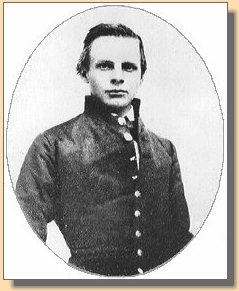
The second installment of a trilogy on young Civil War generals is now available for the reading public. The readers have well received Boy Generals by Adolf Ovies, which tells the story of the relationship of George Armstrong Custer and Wesley Merritt, two men who became Union generals before they were thirty years old. Others reached senior command positions when they were young, and these could be found fighting on both sides of the battle line. The South had its fair share of young generals. These “boy generals” demonstrated exceptional military talent and exemplified the youthful vigor and audacity that characterized the Southern cause.
Reasons for the Promotion
There were some primary reasons for rapid promotion to the general’s rank.
• Casualty Rates
 The Civil War was a brutal and deadly conflict, and the attrition rate among officers was significant. Younger officers often found themselves in positions of authority due to the loss of their superiors in battle. The need to fill leadership roles quickly contributed to the promotion of younger officers.
The Civil War was a brutal and deadly conflict, and the attrition rate among officers was significant. Younger officers often found themselves in positions of authority due to the loss of their superiors in battle. The need to fill leadership roles quickly contributed to the promotion of younger officers.
• Demonstrated Ability
Many of these young officers had already demonstrated their leadership and tactical abilities in the field. Their battlefield successes and tactical innovations earned them the confidence of their superiors and the respect of their peers.
There were some additional reasons why Confederate officers might become boy generals.
• Rapid Expansion of the Confederate Army: At the outset of the Civil War, the Confederacy faced the challenge of rapidly expanding its military forces to match the strength of the Union Army. This necessitated the promotion of younger officers to higher ranks, as not enough experienced officers were available. Many of these young officers displayed exceptional leadership and military prowess, which led to their rapid promotion.
• Fluid Hierarchy: The Confederate Army had a more fluid and flexible hierarchy than the Union Army. This allowed for promotions based on merit and battlefield performance rather than strict adherence to seniority or established protocols.
The Young Generals in Gray
John Pelham
John Pelham, a native of Alabama, was one of the most remarkable boy generals of the Confederate Army. Born in 1838, Pelham attended the United States Military Academy at West Point but left to join the Confederate forces when Alabama seceded from the Union in 1861. Despite his young age, Pelham quickly proved himself as an artillery officer on the battlefield.
Confederate Army. Born in 1838, Pelham attended the United States Military Academy at West Point but left to join the Confederate forces when Alabama seceded from the Union in 1861. Despite his young age, Pelham quickly proved himself as an artillery officer on the battlefield.
Pelham’s defining moment came at the Battle of Fredericksburg in December 1862. Leading a small battery of horse artillery, the 24-year-old Pelham played a crucial role in holding off Union forces. His accurate and deadly cannon fire earned him the nickname “The Gallant Pelham.” Tragically, John Pelham’s promising career was cut short when he was killed in action at the Battle of Kelly’s Ford in 1863 at the age of 24. His bravery and strategic prowess left an indelible mark on the Confederate Army. They earned him a place in history as one of the most youthful and talented generals of the Civil War.
Jeb Stuart
 James Ewell Brown “Jeb” Stuart, born in Virginia in 1833, is one of the most famous and accomplished Confederate boy generals. Stuart’s youthful exuberance, dashing appearance, and exceptional horsemanship made him a beloved figure in the South.
James Ewell Brown “Jeb” Stuart, born in Virginia in 1833, is one of the most famous and accomplished Confederate boy generals. Stuart’s youthful exuberance, dashing appearance, and exceptional horsemanship made him a beloved figure in the South.
Stuart’s exploits as a cavalry commander are legendary. He played a crucial role in many of the significant battles of the Eastern Theater, including the Battles of First Bull Run, Antietam, and Gettysburg. His daring reconnaissance missions and flamboyant style endeared him to his troops and made him a constant thorn in the side of Union commanders.
William Paul Roberts
William Paul Roberts has the distinction of being the youngest commissioned Confederate general. Roberts enlisted at the start of the war and fought in the Battle of Brandy Station, the Gettysburg Campaign, and the Wilderness Campaign. His brigadier general’s commission came on February 23, 1865. He was twenty-three years old. When commissioned, John Herbert Kelly was also twenty-three, but Roberts was one month younger.
younger.
It’s important to note that while some Confederate officers achieved high ranks at a young age, not all did. Age and experience varied widely among Confederate generals; many were older and had extensive military backgrounds. Nonetheless, the Civil War era saw the rise of several remarkable and youthful officers who made significant contributions to the Confederate cause through their leadership and strategic prowess.
The Confederate boy generals were shining examples of youthful vigor, audacity, and military talent during the American Civil War. Despite their age, they made significant contributions to the Confederate cause and left a lasting legacy in the annals of Civil War history. These young leaders demonstrated that age was no barrier to achieving greatness on the battlefield, and their stories continue to inspire those who study the Civil War today.
